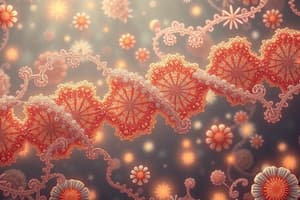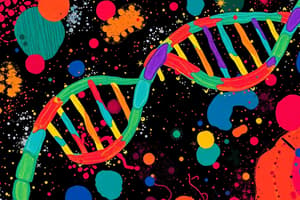Podcast
Questions and Answers
Which RNA polymerase is responsible for the transcription of mRNA?
Which RNA polymerase is responsible for the transcription of mRNA?
- RNA polymerase I
- RNA polymerase II (correct)
- RNA polymerase III
- None of the above
All genes are transcribed in every cell.
All genes are transcribed in every cell.
False (B)
What is the central dogma of molecular biology?
What is the central dogma of molecular biology?
DNA -> RNA -> Protein
Transcription proceeds at _____ nt/sec.
Transcription proceeds at _____ nt/sec.
Match the following RNA polymerases with their primary function:
Match the following RNA polymerases with their primary function:
What is the role of the polyA signal in transcription?
What is the role of the polyA signal in transcription?
Transcription requires a primer to begin.
Transcription requires a primer to begin.
What is the role of transcription factors in the transcription initiation complex?
What is the role of transcription factors in the transcription initiation complex?
Which transcription factors are involved in preventing TFIID rebinding?
Which transcription factors are involved in preventing TFIID rebinding?
TFIIH XPB facilitates the closing of DNA during transcription initiation.
TFIIH XPB facilitates the closing of DNA during transcription initiation.
What event causes abortive initiation to turn into productive elongation?
What event causes abortive initiation to turn into productive elongation?
Capping is performed by three enzymatic steps, including removal of phosphate, addition of GTP, and __________ of Guanosine.
Capping is performed by three enzymatic steps, including removal of phosphate, addition of GTP, and __________ of Guanosine.
Match the following transcription factors with their functions:
Match the following transcription factors with their functions:
What influences the speed of transcription elongation?
What influences the speed of transcription elongation?
Kinases can alter CTD phosphorylation patterns in a way that affects which proteins can recognize and bind to it.
Kinases can alter CTD phosphorylation patterns in a way that affects which proteins can recognize and bind to it.
What is the range of transcription elongation speed?
What is the range of transcription elongation speed?
What is the role of TATA binding protein in transcription initiation?
What is the role of TATA binding protein in transcription initiation?
The major groove of DNA provides fewer interactions for proteins than the minor groove.
The major groove of DNA provides fewer interactions for proteins than the minor groove.
Name the common element required for the expression of a structural gene in eukaryotes.
Name the common element required for the expression of a structural gene in eukaryotes.
The distance between TBP and TFIID is approximately ______ bp.
The distance between TBP and TFIID is approximately ______ bp.
Match the following components with their functions:
Match the following components with their functions:
What sequences signal the beginning and end of an intron?
What sequences signal the beginning and end of an intron?
Which protein complex is recruited to bind the BRE during transcription initiation?
Which protein complex is recruited to bind the BRE during transcription initiation?
Capping of mRNA occurs at the 3' end to prevent degradation.
Capping of mRNA occurs at the 3' end to prevent degradation.
Transcription initiation does not require any protein binding to DNA.
Transcription initiation does not require any protein binding to DNA.
What stabilizes the tight binding of DNA binding proteins during transcription initiation?
What stabilizes the tight binding of DNA binding proteins during transcription initiation?
What is the role of untranslated regions (UTRs) in mRNA?
What is the role of untranslated regions (UTRs) in mRNA?
The process of __________ involves cleavage and polyadenylation at the 3' end of mRNA.
The process of __________ involves cleavage and polyadenylation at the 3' end of mRNA.
Match the following terms with their descriptions:
Match the following terms with their descriptions:
What effect does the Spt5 elongation factor have on RNA Polymerase II?
What effect does the Spt5 elongation factor have on RNA Polymerase II?
Flashcards are hidden until you start studying
Study Notes
Overview of Eukaryotic Gene Transcription and Processing
- RNA plays a critical role in gene expression, serving as a messenger that transmits information from DNA in the nucleus to the cytoplasm.
- Central dogma of molecular biology: DNA → RNA → Protein.
- Transcription involves copying DNA sequence information into RNA, facilitated by DNA-dependent RNA polymerases.
RNA Polymerases in Eukaryotes
- RNA Polymerase I: Transcribes ribosomal RNA (rRNA), accounting for about 50% of total RNA; essential for ribosome structure.
- RNA Polymerase II: Responsible for synthesizing messenger RNA (mRNA) and non-coding RNAs, comprising roughly 3% of RNA.
- RNA Polymerase III: Transcribes transfer RNA (tRNA) and some catalytic RNAs, constituting about 15% of RNA.
Transcription Initiation
- Initiation occurs at a specific promoter region and ends at a polyA signal.
- Eukaryotic cells only express a small subset of the 21,300 protein-coding genes, typically around 5,000 per cell.
Components of the Transcription Initiation Complex
- Transcription factors bind to DNA to enable RNA Polymerase II (Pol II) binding.
- Consensus sequences are specific nucleotide patterns that enhance transcription efficiency.
- Key elements include:
- TATA Binding Protein (TBP): Bends DNA to facilitate binding of Pol II.
- TFIID: A protein complex that includes TBP and various associated factors, vital for recognizing promoter elements.
Steps of Preinitiation Complex Assembly
- TBP binds to the promoter and kinks DNA, allowing access for other transcription factors.
- Other factors, such as TFIIB and Pol II-TFIIF, are recruited sequentially.
- The assembly of the preinitiation complex is tightly regulated to avoid premature transcription.
Transcription Elongation
- Initiation turns into productive elongation after phosphorylation of the C-terminal domain (CTD) of RNA polymerase.
- Elongation rates range from 1,500 to 2,700 nucleotides per minute.
- CTD phosphorylation regulates the binding of transcription factors and facilitates RNA processing.
RNA Processing Post-Transcription
- Capping involves:
- Removal of phosphate from the 5' end of the RNA.
- Addition of guanosine triphosphate (GTP).
- Methylation of guanosine to protect against degradation.
- Splicing removes non-coding introns, characterized by specific GU-AG sequences.
- Mature mRNA contains a coding sequence and 5' and 3' untranslated regions (UTRs) that assist in export and regulation.
Transcription Termination
- Termination requires processing of the 3' end, including cleavage and polyadenylation.
- The cleavage/polyadenylation complex assembles on the RNA to ensure proper termination.
- Exonuclease Xrn2 degrades residual RNA post-termination, while Pol II can modulate elongation rates through various factors.
Important Notes
- Not all transcription factors are needed for transcribing chromatin-associated DNA, whereas naked DNA requires more general transcription factors.
- Transcription is a highly coordinated and regulated process, integrating multiple signals for efficiency and fidelity.
Studying That Suits You
Use AI to generate personalized quizzes and flashcards to suit your learning preferences.




